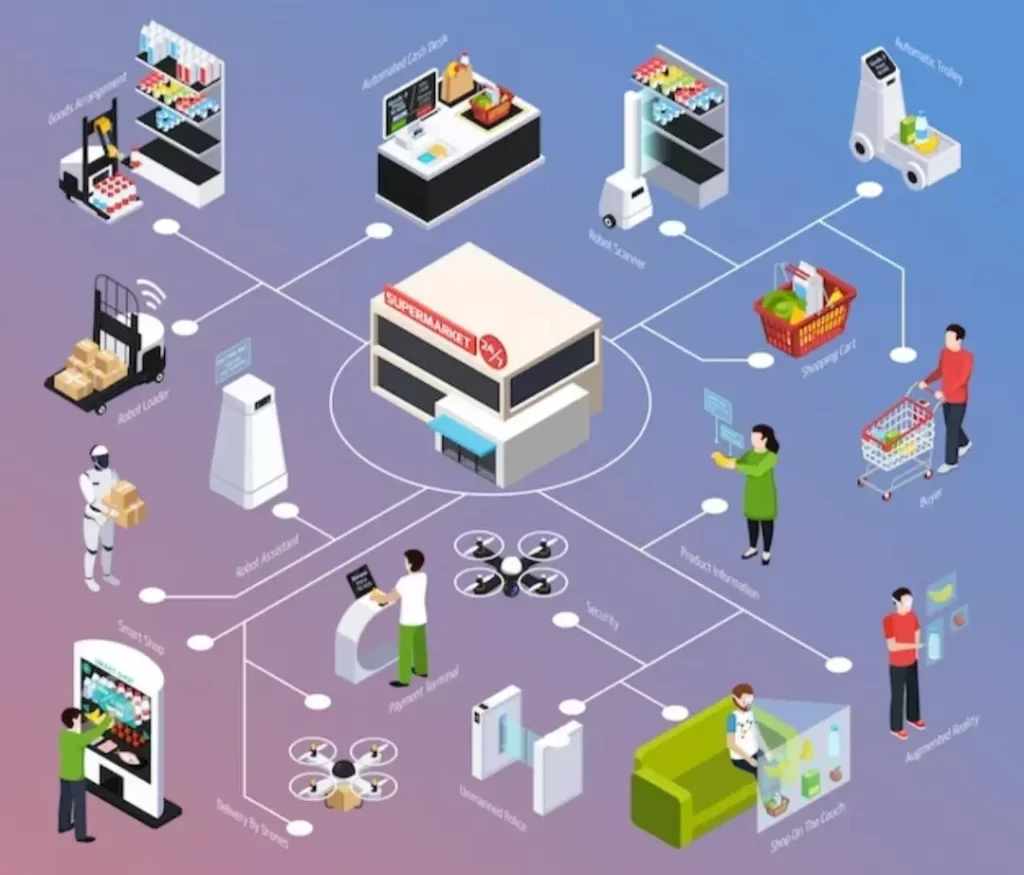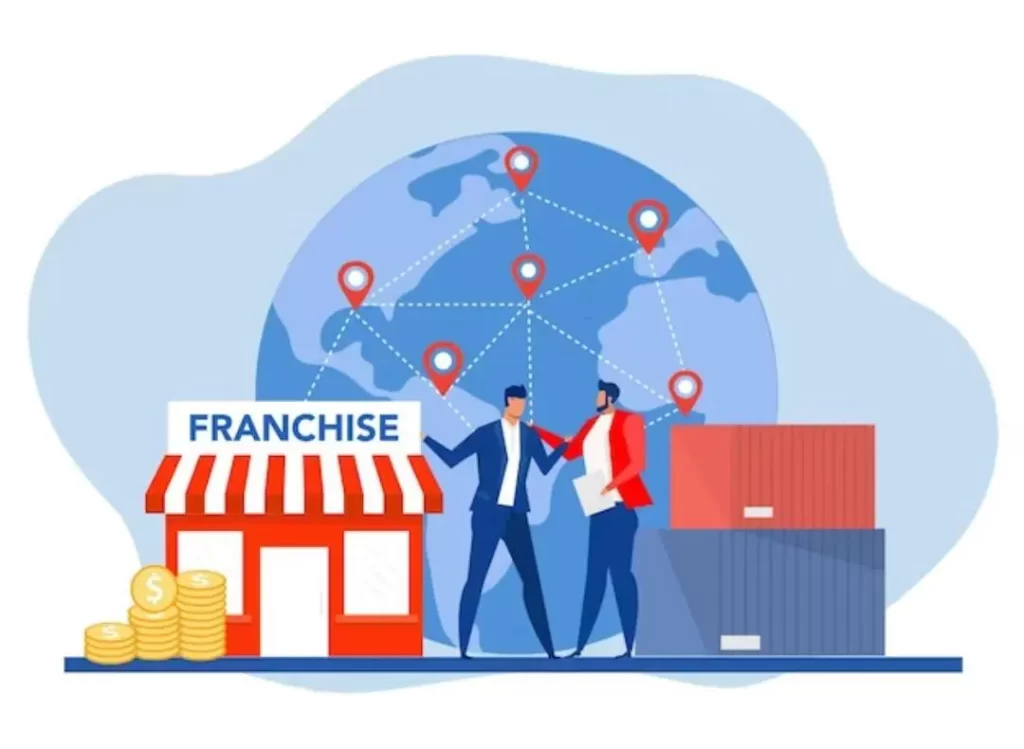Types of Supermarket Franchise Models in India: Best Guide for Beginners
Types of Supermarket Franchise
If you want to know about the types of Supermarket Franchise Models in India, follow this ultimate guide all about supermarket franchises and their different types.
Franchising is the practice of operating or owning a business by the same party that purchases a license from a market leader, enabling the licensee to begin using the brand name, the licensor’s goods, and numerous operational practices. One of the finest options for a franchisee and a franchisor is a supermarket franchise business plan. Establishing franchisees in various regions fosters brand extension, economic growth, and job creation.

To establish their position in the market and promote their shares in this quick-paced environment, several brands adopt franchise models. Each franchise business model is unique. To avoid missing out on the best franchise opportunity, you must be knowledgeable about all types. Many people are unaware that there are variations among franchise models. This blog covers different types of grocery franchises in India. These include company-owned company-operated (COCO), company-owned franchise operated (COFO), franchise-owned company-operated (FOCO), franchise-owned franchise operated (FOFO), warehouse franchise and more.
Types of Supermarket Franchise Models in India
COMPANY-OWNED COMPANY-OPERATED FRANCHISE MODEL (COCO)

As the name implies, the firm owns and runs the business in a specific location under this deal. The franchisor is responsible for covering all startup and ongoing costs. Wealthy franchisors do not feel the need to share their gains with their franchisees. A franchisor could begin with its own shops before moving forward with franchising. Therefore, COCO is the name for those initial outlets.
Example of a COCO Franchise Brand: Relaxo
The footwear company Relaxo, founded in 1976 by two brothers named Ramesh Kumar Dua and Mukund Lal Dua, is today one of the top ones in the nation.
Advantages of the Coco Franchise Model:
- It aids a business in showcasing its location and product line to clients and potential franchisees.
- Since there is a lack of a channel partner to split the earnings with, the entire sum stays within the organization.
- It enables the business to grow in places where a franchisee is difficult to come by.
- Supermarket franchise operations also perform better at COCO than under any other franchise model. While the franchisor runs the COCO franchise system, the franchise partner also has a share in the company.
COMPANY-OWNED FRANCHISE OPERATED FRANCHISE MODEL (COFO)
A reliable name and operational support are provided by the franchisor to you, the franchisee, in a COFO model. This organization guarantees consistency in both product quality and service standards, which is essential for the market for grocery franchises in India. Since you have access to the parent company’s marketing plans and established clientele, this model frequently proves helpful. The franchisee also handles other operating expenditures including payroll, power, and other fees.
Example of the COFO Franchise Model:
The most common example is call centers in India that answer or place client calls on behalf of a business. Then there are company outlets, often in high-traffic areas, which are run by a franchisee but are actually owned by the franchising firm.
Advantages of the COFO Franchise Model:
- As an entrepreneur supervises the outlet, its productivity and efficiency are excellent.
- There is no misallocation of the franchising company’s resources to other areas of the business.
- A G-Fresh Mart Supermarket franchise can be set up in regions where it is having trouble attracting franchisees.
Franchise Owned Company Operated (FOCO)

Being one of the most well-liked supermarket franchises, the FOCO franchise concept is claimed to feature a number of advantageous and lucrative effects. The FOCO franchise concept is typically favored by many investors who already have a consistent stream of income from several sources. The FOCO model might be one of the best learning experiences for you if you are just starting out in business and have no prior experience.
Example of a FOCO Franchise Brand:
McDonald’s is the ideal example of the FOCO concept, particularly in the hospitality sector. In 50 cities, Ferns and Petals has more than 150 outlets. Barista Café, Bistro57, Croma, and other supermarket franchise brands are examples of FOCO franchise models.
Advantages of the FOCO model:
- Better customer service because the corporation controls the customer experience.
- Both the franchisor and the corporation are exempt from paying setup and operating costs.
Franchise Owned Franchise Operated (FOFO)
Many businesses that seek to reduce the operational costs for their locations employ the FOFO franchising model. An illustration of the model is a cafeteria operating in a corporation or a hospital that is owned by any company but is run by a franchise during a lease period. They are frequently seen in Indian markets, where numerous brands have been active for decades.
Advantages of the FOFO Franchise Model
- The approach opens up a wide range of opportunities for start-up companies; aspiring businesspeople can use it as a springboard for success.
- Many companies and franchises are making significant profits while also finding fulfillment in their jobs due to their liberty to do as they like.
Warehouse Franchises
Franchises that operate warehouses concentrate on serving wholesale clients and making large purchases. These shops have a wider variety of goods, which attracts retailers and other small companies. They employ the required equipment and technology investments to effectively manage warehouse operations. Forklifts, shelving, inventory management software, and security systems are just a few examples of this. Employing and training employees is essential for efficient warehouse operations. “Metro Cash & Carry” and “Best Price Wholesale” are a couple of franchisees that operate warehouses.
Conclusion

Indian supermarket franchise models provide a wide range of opportunities, taking note of different business sizes and client needs. The secret to success is knowing your target market, whether you’re interested in a mini-supermarket franchise or a warehouse-based model. In conclusion, the market for grocery franchises in India offers a wide range of franchise opportunities, each of which targets a distinct market niche. Being successful in this cutthroat industry demands hard work and dedication to satisfying consumer needs.
Don’t Miss This – How to open a Grocery Supermarket? Comprehensive Guide
Frequently Asked Questions (FAQ): Supermarket Franchise
1. How much capital is required to launch a supermarket franchise?
Ans: It is highly variable. While some cost hundreds, others cost millions. The brand and franchise type will determine this.
2. Do I have to abide by all of the franchise company’s rules?
Ans: Yes, typically. To maintain the brand’s strength and consistency, they have regulations.
3. Can I subsequently sell my grocery franchise in India?
Ans: Generally, yes. However, the franchise firm may need to give their approval.
4. What happens if my G-Fresh Mart store franchise is unsuccessful?
Ans: The risk exists. Losses are a possibility. Therefore, planning and study are essential.
5. How long is the term of a supermarket franchise agreement?
Ans: It can be anywhere between five and twenty years.
